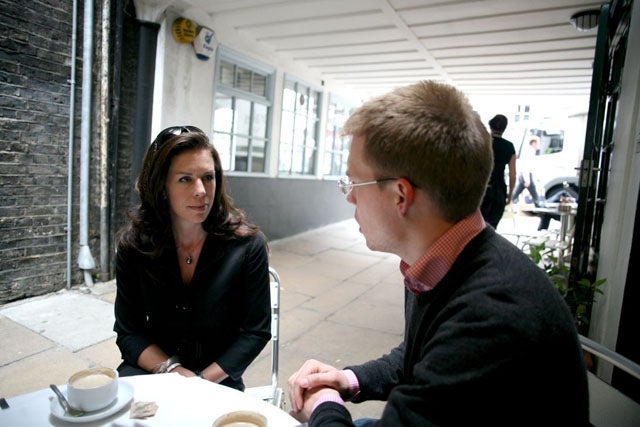Is personal branding the way to get on at work?

After fumbling with the door to 64 Knightsbridge in an unpolished way, I meet the polished Louise Mowbray, personal branding expert. She's attractive, all Liv Tyler lips, white teeth and diamonds. Her brand screams elegance and poise (the exact opposite of my bumbling entrance). So my first thought is, if the aim of this is to find a personal brand, can I have yours?
But that would be missing the point. For, as I quickly learn, one's personal brand must be authentic. "If you've even got the spark in you, you can develop it, but if it doesn't exist at all, it's a little like the emperor's coat – it's a little hard to wear," says Mowbray. "The idea is to understand exactly who you are, what you're capable of, where you want to go, and make sure that it's authentic."
Richard Branson, for example, has a strong personal brand. "He had a privileged upbringing but that's not what he's sold," she says. "He's sold the image of the underdog. He is the explorer; he is the guy who takes risks and he's lived his life authentically by that."
Personal branding is something that's been around for about 10 years and the service Mowbray provides is aimed at the top-performing executive: the businessman or woman who has got to the top and has ticked all the boxes, but has perhaps reached an impasse, or is seeking the competitive edge. It comes with an executive price-tag to match: £1,200 (£500 for the first session, then £350 for each subsequent hour).
Apparently, what we say – the actual content of what we're saying – accounts for just seven per cent of what we communicate. "Seven per cent aside, what you look like, how you sound and your body language tell the story – that's the key. And actually, how you sound has more weight than how you look, which is very interesting," she says.
So since your brand will mostly be whirring away without your knowledge, your brand must also be consistent, so that it can become well-known, and it must be compelling to your target audiences: the people you work with, your boss, and your future bosses. If you achieve this, your brand can work hard for you. "The idea about a fabulous, strong, powerful personal brand is that people know us for what we do and it brings the opportunities to us," she says.
The first meeting is like a job interview. Where do I want to be in five years? What's my ultimate job? How do I see myself? "Conscientious, nice guy, shy, awkward, nervy, reticent, introverted..." Thankfully she stops me at this point. "This brand is not working hard for you," she says. "You don't want this to be what you're known for."
Quite right. There are moments when I start to feel like I'm on a psychiatrist's couch; but Louise makes it clear that this is strictly business advice. "I never coach people on life – I don't feel I'm qualified to do that. But you can take your personal brand and apply it to everything."
The second consultation requires me to do a lot of embarrassing homework, asking 20 of my nearest and dearest to say what they think of me. Just how do you pose that question without coming across as insecure and narcissistic?
The responses I get are largely complimentary. But surely it's inevitable that people will be nice about you to your face? Not so, says Louise. "This is a wonderful exercise because it's an opportunity for somebody to give you a jab if there's something they don't like. You've got to believe what came back."
So, trying not to let my insecurities get in the way, we work our way towards my brand: "I'm a journalist who writes features. I'm young, creative and open, but at heart traditional, self-contained and family-orientated. I am ambitious but don't forget my roots. I'm an optimistic dreamer who looks forward, but has an essential melancholy."
In the last of our sessions together, Louise tells me what to do now I have crafted my personal brand statement. "The key now," she says, "is to go about reinforcing your actions – find some creative ways of actually showing your brand. It should instil a sense of comfort and confidence in who you are."
For all my doubts, this is the one reason that makes me think personal branding might be good for us all: it's founded on common sense. That one requirement – authenticity – means that the person you find at the heart of it all, is yourself. A clarified, and more confident, vision of yourself.
As Louise puts it: "Be yourself, but be it better, be it more." I couldn't have branded it better myself.
Join our commenting forum
Join thought-provoking conversations, follow other Independent readers and see their replies
Comments
Bookmark popover
Removed from bookmarks